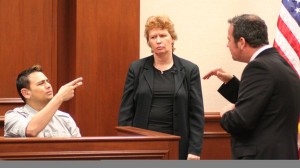Legal
Highly qualified interpreters are needed to work in legal settings—particularly in court and law enforcement proceedings where matters involving high-risk and personal freedoms are often the focus. According to several needs assessments conducted by the NCIEC (2007; 2010), there is a shortage of qualified interpreters to work in legal settings. Therefore, one of the goals of the NCIEC is to promote the training and certification of interpreters in this area of specialization.
Interpreting in the legal setting is a long-recognized area of specialization in the field of ASL-English interpreting. The legal setting is broad and includes law enforcement investigations, interviews and interrogations, client-attorney interactions, and a wide range of court and legal proceedings. Tradition from the field of spoken language interpreting and the legal community contribute to the conventional way legal interpreting work is performed. As well, practices have been conceived by ASL-English interpreter practitioners over time through a process of application of theory drawn from the profession’s scholarship. As a result, patterns of practice and best practices have been identified and guide the work of practitioners in this area of specialization.
 Working in the legal setting requires advanced interpreting competence—including the ability to fluently execute consecutive and simultaneous interpreting of complex texts, work effectively in teams—particularly the ability to work collaboratively with Deaf Interpreters (DIs), and to adapt language use to a wide range of sign language users. Further, it requires an in depth understanding of law enforcement and the legal system.
Working in the legal setting requires advanced interpreting competence—including the ability to fluently execute consecutive and simultaneous interpreting of complex texts, work effectively in teams—particularly the ability to work collaboratively with Deaf Interpreters (DIs), and to adapt language use to a wide range of sign language users. Further, it requires an in depth understanding of law enforcement and the legal system.
There are unique parameters impacting the work of interpreters in this setting that are the result of case law, legal and evidentiary procedures. Typically, the knowledge and skills required of interpreters to work in this setting are acquired after completion of a solid academic foundation in interpreting, coupled with multiple years of practice, followed by specialized training in legal interpreting and supervised field experience.
Certification of interpreters in this area of specialization is administered by the Registry of Interpreters for the Deaf, and requires that one possess generalist certification, and completion of a set number of hours of training and supervised work experience prior to application. The certification process involves a stringent written and performance exam. More information about the Special Certificate: Legal can be found at the RID website.
Directory of NCIEC Master Legal Trainers
Preparing Deaf and hearing interpreters to interpret in court and legal settings was a concentrated focus for the NCIEC that led to the development of two sets of curriculum and the hosting of two train the trainer events led by Anna Witter-Merithew, M.Ed., Director of the MARIE Center. With support from the NCIEC regional centers and the University of Northern Colorado’s DO IT Center staff, Carla Mathers, Anna Witter-Merithew, along with teaching consultants, Eileen Forestal, Pasch McCombs, and Lynne Wiesman, implemented the train-the-trainer seminars.
All of the trainings can be adapted for seminars and course work, study groups, mentoring sessions and other types of learning activities.
These master trainers have received concentrated training on five thematically-based modules focusing on areas in legal and primarily court interpreting for which deaf interpreters have often been retained. The thematically-based Deaf Interpreter modules are:
- Introduction to the DI Legal Modules
- Module 1: Interacting with the Players
- Module 2: Deaf Minors
- Module 3: Teaming
- Module 4: Law Enforcement
- Module 5: Practical Applications
Master Trainers for the Deaf Interpreters in Legal Settings
| Christopher Tester | tester.christopher@gmail.com |
| Lisa Perry Burckhardt | lperryburckhardt@gmail.com |
| Ryan Shephard | ryan.a.shephard@gmail.com |
| Robin Shannon | robin.stafford.shannon@gmail.com |
| Rayni Plaster | rayni.plaster@gallaudet.edu |
| Jimmy Beldon | jimmy@kisasl.com |
| June Prusak | cdijune@yahoo.com |
| Eileen Forestal | eileenog@gmail.com |
These master trainers have received training on how to implement training packages focused on an aspect of legal or court interpreting central to the work of interpreters in this setting. These training packages included these topics:
- Interpreting Lines of Questioning: Designed to increase the ability of participants to interpret structured lines of questioning as they are used in legal contexts
- Increasing your Scope of Influence as a Legal Interpreter: This package assists participants with understanding of their own styles of communication and identifying the characteristics of the communication styles of others towards the goal of effective collaboration.
- Proceedings Interpreter(s): Prepares participants to function as proceedings interpreters by examining role and responsibility and application of best practices.
- Preparation Strategies for Deaf-Hearing Interpreting Teams: Assists participants in gaining an appreciation of the various elements associated with team preparation and the agreements needed to guide effective collaboration between team members.
The Master Trainers for the General Legal Settings
| Christopher Tester | tester.christopher@gmail.com |
| Lisa Perry Burckhardt | lperryburckhardt@gmail.com |
| Ryan Shephard | ryan.a.shephard@gmail.com |
| Robin Shannon | robin.stafford.shannon@gmail.com |
| Rayni Plaster | rayni.plaster@gallaudet.edu |
| Jimmy Beldon | jimmy@kisasl.com |
| Jana Owen | jana@janaowen.us |
| Tracy Clark | tracy.clark.3@gmail.com |
| Liz Mendoza | mendozaliz@cox.net |
| Linda Ross | lross@hallenross.com |
| Ben Hall | admin@hallenross.com |
| Eileen Forestal | eileenog@gmail.com |
| Pasch McCombs | Paschmcc@aol.com |
| Carla Mathers | carla.mathers@gmail.com |
| Lynne Wiesman | lynne@signs-of-development.org |
| Anna Witter-Merithew | awittermerithew@carolina.rr.com |
The individuals listed in this Directory are available to provide trainings and workshops. For questions about trainers’ availability and fees, please click their email addresses to contact them directly.
The NCIEC developed the following products in support of the judiciary and interpreters specializing in legal interpreting.
- The Institute for Legal Interpreting (ILI): Highly Effective Court Interpreting Teams in Action Videos and Workbook were designed to engage practitioners in the analysis and application of practices and protocol associated with Deaf-hearing interpreting teams working in legal settings. They focus on the work of four teams interpreting different aspects of a child custody civil proceeding. The videos and associated workbook activities include preparation for interpreting the different aspects of the proceeding, interpreting expert testimony, interpreting Deaf witness testimony, using consecutive interpreting and notetaking, and how to interface with court personnel as part of the management of the interpreting process. Another important part of the analysis activities is an exploration of interpreter-initiated utterances that occur during the interpreting process and gaining insight into the purpose, function, and manner in which such interventions occur. The highly popular materials were distributed at the 2014 ILI Conference and made available for limited distribution after the conference. The 126-page workbook designed to guide independent or group study of the interpretations is available for download. Check back for information about online release of the video component!
- Toward Effective Practices: Competencies of Interpreters Specializing in Legal and Court Interpreting document that details the skills, knowledge and attributes necessary for effective work in these settings.
- A Best Practices of ASL-English Interpreters in Legal and Court Settings document detailing 24 best practices to employ when working in legal and court settings—including law enforcement.
- Interpreting in the Immigration Settings: Summary of Focus Groups
- The Use of Remote Technology in Legal Interpreting: Focus Groups Summary
- Fact Sheets for use in educating the judiciary about unique elements of working with sign language interpreters in legal and court settings—such as Deaf interpreters as part of a team, team interpreting, unique linguistic considerations of Deaf litigants, and general staffing considerations.
The Americans with Disabilities Act (ADA)
Deaf Interpreters as Reasonable Accommodation
Linguistic Considerations of Deaf Litigants
Placement of Sign Language Interpreters in Court
Quick Tips for Sign Language Interpreters in the Courtroom
Securing a Qualified ASL-English Interpreter
Use of Interpreters in a Law Enforcement Setting
The Use of Interpreting Teams in the Courtroom
The Use of Video Remote Interpreting in the Courtroom
Working with Sign Language Interpreters in Contested Matters
Working with Sign Language Interpreters in Juvenile Matters Involving Deaf Participants
Working with Sign Language Interpreters When There are Deaf Jurors or Deaf Audience Members
- Deaf Interpreters in Court brief analyzing the use of Deaf individuals as interpreters by examining state law, case law and best practices. This is an excellent tool for educating the judiciary.
- An annotated bibliography of literature and resources useful to the teaching and practice of legal interpreting.
- Miranda from the Perspective of Law Enforcement is an ASL translation of a segment from the TV program “Homicide” in which the team of homicide detectives share their perspectives on the Miranda Warning. It provides important insight into the rights of all suspects and the disconnect between those rights and the desire of law enforcement to secure information necessary to solve crimes. It also provides insight into how certain rights might be discussed in ASL.
- Legal Terminology Search Engine: 300 commonly seen terms in legal discourse translated into ASL.
The goal of the Consortium is to advance the number and quality of interpreters qualified to provide services in legal settings.
Additional Resources
For additional resources on Legal Interpreting, visit our Resources pages.
